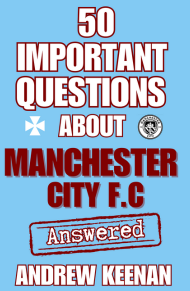The Birth of Football and the Origins of Manchester City
Twenty-two: The Fall of Chesters Thompson
On 4 June 1893 the Sunday Chronicle, noting that several Second Division clubs were ‘saddled with the serious weight of debt’, drew particular attention to the plight of Ardwick:
‘What sort of story must some of the teams in the Second Division have to tell? It is suggested that very few appear to have issued balance sheets at all, though a correct financial statement for a club such as Ardwick would I imagine have been singularly interesting.’
Ardwick’s finances were certainly attracting the interest of the increasingly disgruntled shareholders of the Chesters Brewery. The company had expanded rapidly following its flotation in 1888, with a series of acquisitions increasing the number of public houses it owned had from 81 to 156. But the “ill-advised” purchase of the bankrupted Salford Brewery in 1892, widely thought to be worth less than a quarter of the purchase price, had pushed Chesters Brewery to the brink of bankruptcy.
On 27 June, after a “lively” meeting between directors and shareholders, George Clay—a Liberal alderman and one of Chesters Thompson's main political rivals—was elected to the board.
Noted for his ‘fearless outspokenness’, Clay had been voted him off the board in 1890 in favour of Conservative councillor John Battersby, a ‘zealous and consistent supporter of the Conservative cause’, prominent Freemason, and friend of Chesters Thompson. More ominously, Chesters Thompson and Clay were also locked in a political struggle over the Manchester Ship Canal. Earlier that month the pair had both been elected directors of the newly formed Ship Canal Company, having fought an ill-tempered six-month battle over the canal's funding as members of the City Council's Special Sub-Committee.
Soon after his return to the board Clay prepared a damning report for shareholders. It confirmed that the company had massively overpaid for the Salford Brewery, but ‘after many acrimonious exchanges and some litigation’ it was forced to complete the purchase. After a £30,000 loan from the executors of founder Thomas Chesters’ will was used to shore up the company’s finances, Chesters Thompson’s position was hanging by a thread.
In July, Clay replaced him as chairman. Encircled, and without his key boardroom ally John Battersby, who had died from flu in September 1891, Chesters Thompson soon realized his time was up. On 22 August, following an acrimonious board meeting, he resigned from the company.
By that time an internal audit had revealed that that the company had spent £2,600 on the club. To put that into perspective, First Divison Newton Heath were only valued at £2,000 when they were floated on the stock market that year.
On 8 October Empire News reported:
The Committee of the Ardwick Football Club are at length taking the step they ought to have taken twelve months ago. The Chairman, on behalf of the Committee, has issued an invitation to the season-ticket holders to meet him to-morrow night at the Hyde-road Hotel, when he will lay before them a statement as to the affairs of the club, and ask their assistance to carry on the organisation till such time as it can be converted into a limited liability company.
The company, however, cannot be formed yet awhile. There are sundry difficulties with regard to the rental of the ground and stands to be first overcome, and it is to surmount these difficulties that the meeting is called. That something must be done, and done quickly, is patent to everybody who knows anything about the state of affairs.
The Ardwick people, too, are evidently bent on saving as much money as possible in wages, for they have this week dispensed with the services of Jones, Milne, Carson, and Mills, and some folk say there are more to follow.
Five days later, the club’s worst fears were confirmed. At a board meeting of Chesters Brewery, Ardwick FC’s debt
‘was considered and the company’s solicitor was instructed to take legal proceedings for recovery.’
Ardwick had finished the 1892-93 season in fifth place (out of 12) and were also the fifth best supported team in the Second Division after Woolwich Arsenal, Liverpool, Newcastle United and Walsall Town Swifts.
But its battle for survival had now begun.
My book on City’s origins, A Man’s Game, is available on Amazon here.
What was the first song at City? Why did Steve Coppell resign? Did City have a “Fifth Column”? Did the IRA try to burn down Hyde Road? Who started the “banana craze”? And what was Maine Road's Scoreboard End called before there was a scoreboard?
All these questions—and more—are answered in my latest book, available on Amazon here.
You can subscribe for free, below, and have the latest stories sent straight to your inbox.





Used to love a pint of Chester's back in the 80s , never knew the beer had such a tainted history!!
Hi Andrew
I'm currently researching the impact of the 'Murphy Riots' on west Gorton (especially the events at St Francis, 'The Monastery').
I came across your piece 'Are City a Protestant Club' - an extract from the above which quotes reports from the Ashton Reporter of May 1868 concerning the church and the riots.
Do you retain / are you able to share digital copies of these reports? I'd be most grateful, and it would be of real benefit to my research. No prob if not!